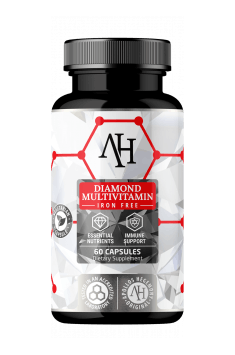Understandably, our bodies' requirements are different, depending on many factors. They depend on our lifestyle, type of work, and physical effort connected with it, as well as our size. It turns out, however, that we also consume vitamins at a different rate and in different proportions. This variation is mainly caused by hormones.
Against baldness
Statistics and demographic forecasts are implacable: the average man will live 6-8 years shorter than an average woman. Men suffer from life-threatening heart diseases too early and lead a lifestyle that promotes cancer and skeletal problems. They could avoid many risks, without making a revolution - it's enough to spend more time exercising outdoors and change their eating habits. By diversifying the menu with rich sources of vitamins, every third man has a chance to avoid cancer, mainly related to those of the digestive system. If he opts for vegetables and fruit and limits fatty, fried meats and salty sticks, he reduces the risk of heart attack by as much as 30%. However, there are also many less serious conditions, which can be also unpleasant – like getting bald.
Most often, the first hair loss in the frontal area occurs around your fortieth birthday. As the hair thins, the top of the head becomes bald. It turns out that this can be prevented, at least to a moderate extent, by providing the body with about 1 mg of vitamin A every day. Undoubtedly, male pattern baldness is often genetically determined, but even then proper nutrition slows down the process, and getting enough Vitamin A intake should be a top priority for men.
Good sources of vitamin A include dairy products, eggs, and fish, as well as many vegetables and fruits (e.g. carrots, lettuce, tomatoes, green peas, green beans, cherries, apricots, oranges). Those of animal origin usually also provide vitamin D and calcium, which are beneficial for male bones.

Keep your face (in shape)
Vitamin A is also of considerable importance for the male complexion. Although men, in accordance with the will of nature, by definition, do not have smooth cheeks, they should also take care of the facial skin from the inside. Daily beauty treatments, especially shaving, often make the male face irritated, red, and scratched. The problem is usually solved by providing the body with an adequate dose of vitamin A. If poorly healing, unsightly wounds form on the face, it is almost always the result of a deficiency.
Although vitamin A has a significant regenerative capacity, it alone will not provide men's skin with the maximum good look. Usually, it needs a set of vitamins E and C. It is these three vitamins that men are most often lacking.
Vitamin C, needed mainly to smooth the skin, will provide a diet enriched in fruits (rosehips, strawberries, currants, kiwi) and vegetables (cauliflower, spinach, white and red cabbage, peppers). Vitamin E, not coincidentally called the vitamin of youth, is most easily supplemented by consuming vegetable oils (e.g. as an addition to a salad), leafy vegetables, legumes, and wholemeal products like wholemeal bread or coarse groats.






